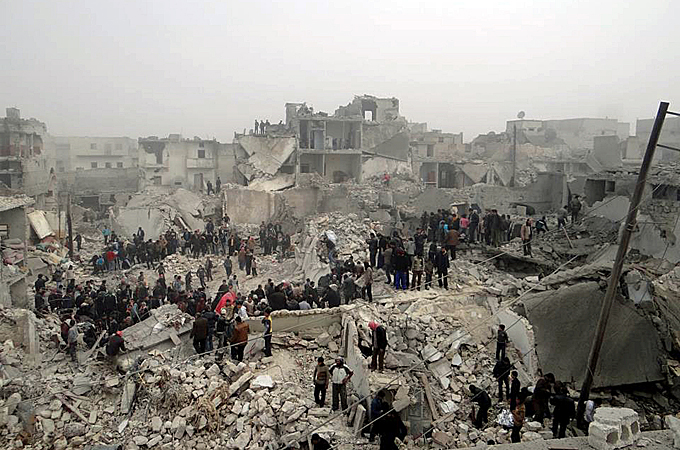Outgoing UN human rights chief Navi Pillay slams “international paralysis” over nearly three-and-a-half year conflict.

More than 191,000 people have died in Syria, United Nation human rights chief Navi Pillay has said, lashing out at “international paralysis” on the nearly three-and-a-half year conflict.
The South African, who wraps up a six-year stint as head of the UN human rights commissiom at the end of this month, has criticised world leaders for their lethargy on a wide range of conflicts.
After chiding the UN Security Council on Thursday for what she called a lack of resolve in ending crises, Pillay said in a statement on Friday the dwindling global interest in Syria was “scandalous”.
“I deeply regret that, given the onset of so many other armed conflicts in this period of global destabilisation, the fighting in Syria and its dreadful impact on millions of civilians has dropped off the international radar,” she said.
“The killers, destroyers and torturers in Syria have been empowered and emboldened by the international paralysis.”
Pillay gave a toll of 191,369 deaths recorded between March 2011 when the war broke out and April this year, but said it was likely an underestimate. Among the dead were 9,000 children.
The conflict erupted when security forces cracked down on protesters, sparking an uprising against President Bashar al-Assad’s regime that escalated into full blown civil war.
Pillay said there had been “serious allegations that war crimes and crimes against humanity have been committed time and time again with total impunity” and complained that the deadlocked Security Council had failed to refer the case of Syria to the International Criminal Court “where it clearly belongs”.
The UN last gave a death toll on the conflict in July 2013 when Secretary General Ban Ki-moon put the number killed at more than 100,000.
It had stopped providing tolls because of concerns over the accuracy of the numbers supplied by a range of sources, Pillay’s spokesman Rupert Colville told reporters.
But after working closely with several of the groups, the rights agency again felt it was safe to report the numbers, Colville said.
“It is important that the world has an idea of the scale of the killing in Syria,” he said.
Colville said between 5,000 and 6,000 people were dying in Syria every month.
“This is a horrific number of killings,” he said. “The most important thing to remember … is that this is not a number, it’s people.”
‘Wholly avoidable human catastrophe’
The UN report said the total could be a significant underestimate, with nearly 52,000 deaths not counted because they lacked a name, date or location, while many killings also go unreported.
It found that more than 85 percent of those killed were male, but did not differentiate between combatants and civilians.
Nearly 9,000 children, including more than 2,000 under the age of 10, were among the dead, it added, but cautioned that victims’ ages had not been recorded in over 80 percent of cases.
The report did not apportion blame for the killings.
Pillay stressed the “enormity of the suffering” that the numbers represent.
“It is scandalous that the predicament of the injured, displaced, the detained, and the relatives of all those who have been killed or are missing is no longer attracting much attention,” she said.
Pillay urged governments around the world to “take serious measures to halt the fighting and deter the crimes”.
Above all, she said, states should “stop fuelling this monumental, and wholly avoidable human catastrophe through the provision of arms and other military supplies”.
Source: Al Jazeera








